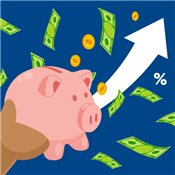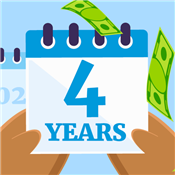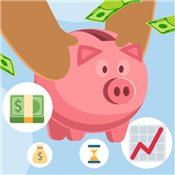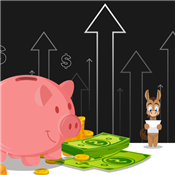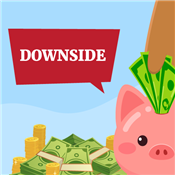APY vs Interest Rate
Comparing interest rates can get confusing. Should you look at APR or APY to determine what's best? Read on to learn everything you need to know.
 |
| © CreditDonkey |
Focusing on advertised interest rates won't give you an accurate picture of your potential earnings. So which figures should you pay attention to? Read on for the answer.
Difference Between APY vs Interest Rate
When shopping for savings accounts and investments, you'll likely encounter the terms APY (Annual Percentage Yield) and interest rate. These are two distinct financial concepts:
- Interest rate is the flat percentage rate that is earned in a year. It does not factor in any compounding periods.
- APY takes into account the flat interest rate plus the compounding that occurs over the course of a year. The more frequently interest compounds, the more money you'll earn.
If you're looking to invest in an account that compounds interest more frequently than once a year, looking at just the interest rate won't give you the full picture.
- APY vs APR
- How Does an APY Work?
- Certificate of Deposit
- CD Ladders
- Money Market Accounts
- High-Yield Savings Accounts
- High-Yield Checking Accounts
APY vs APR?
In simplest terms, APY is typically used to describe how much you'll earn on an investment. APR describes how much interest you'll pay on a loan.
APY factors in both the interest rate and the compounding period to show the percentage you can expect to earn in a year. Many banks offer quarterly, monthly, or even weekly compounding periods, meaning your interest will add up to more than if interest was earned only yearly.
How Does an APY Work?
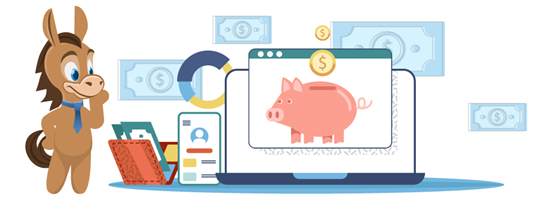 |
| © CreditDonkey |
APY is the annual percentage yield that you'll earn on your investment. It takes into account the rate at which your interest compounds throughout the year, which could be monthly or even daily.
What does it mean when interest is compounded? And how frequently does it happen? We cover the main types of interest, simple and compound, below.
Simple Interest
With simple interest, your earnings are only based on the principal investment.
If you put $1,000 into an account that pays 5% interest annually, you would receive $50 in interest at the end of the year. The following year, you'll earn another $50 in interest.
Typically, you won't take interest payments in cash year after year. Instead, you'd allow the interest to accumulate in the account with your original deposit. That's where compound interest can work in your favor. Keep reading to learn how.
Compound Interest
Compounding interest means the interest you've already earned is added to your original balance.
The new balance is then used to calculate the next interest payment. Not only are you earning interest on your initial investment, you're also earning interest on the interest. Depending on the type of account and the institution you're investing with, your interest may compound quarterly, monthly, or even daily.
You can consider the same example as above with $1,000 initial investment and 5% interest. Here's what happens when interest compounds:
| Period | Balance | Interest Rate | Interest Earned | New Balance |
|---|---|---|---|---|
| 1 | $1,000.00 | 5% | $50.00 | $1,050.00 |
| 2 | $1,050.00 | 5% | $52.50 | $1,102.50 |
| 3 | $1,102.50 | 5% | $55.13 | $1,157.63 |
| 4 | $1,157.63 | 5% | $57.88 | $1,215.51 |
| 5 | $1,215.51 | 5% | $60.78 | $1,276.28 |
Earning interest can build your savings and allow you to retire when that time approaches. But what are the best ways to capitalize on interest? Keep reading to learn about some accounts to consider.
In 1790, Ben Franklin willed about $4,500 ($100K–$124K today) each to Boston and Philadelphia. After 100 years, 75% of the funds could be used to fund civic projects. The rest was to be reinvested for an additional 100 years.
Here's how each city's trust performed:
- Boston's trust grew to roughly $400,000 in the first 100 years, which was used to create the Benjamin Franklin Institute of Technology. In 1990, Boston's investment reached approximately $4.5 million.
- Philadelphia's investment reached $100,000 in the first 100 years (lower than Boston's investment due to differing investment philosophies) and grew to $2 million after the full 200 years.
Certificate of Deposit
Certificate of Deposits (CDs) allow you to deposit a fixed amount of money for a fixed amount of time. You can expect to earn between 2.75 and 3.5% APY on most CDs. Plus, many CDs offer daily compounding interest.
Pros
- Earn interest at a set rate
- No fees to open or maintain the account
- Guaranteed rate of return
- Higher APY than savings/checking accounts
Cons
- Money inaccessible during CD term
- Fees for early withdrawal
While CDs are a fairly non-liquid way to earn interest, there is a way to use CDs to keep your cash a little more accessible. Keep reading to learn more.
CD Ladders
While CDs offer a higher interest rate, it's not always ideal to have your cash tied up for a long period of time. Laddering allows you to gradually build up to ten-year CDs while keeping your money somewhat liquid
Here's how you do it:
- Split your investment into 10 equal amounts
- Invest each piece for a different length of time: 1, 2, and 3 years, up to 10 years
- When the one-year investment comes to maturity, reinvest it into a 10-year CD
- Each year as a CD matures, reinvest it in a ten-year CD
You could also do this for a shorter time period than ten years. Depending on your financial situation, you could start at five years and maintain even more liquidity.
Eventually, all your CDs will be ten-year investments. However, one of your CDs will mature each year, keeping some of the investment liquid.
Money Market Accounts
Money market accounts are like traditional savings accounts. On average, you can expect to earn between 0.08% and 0.11% APY. Here are several reasons to consider one:
Pros
- Higher interest rates
- Complete liquidity on funds
- Insured by FDCI or NCUA
- Safer than investments
- Up to 6 transfers per month, plus checks
- Immediate access to funds
Cons
- Higher minimum deposit
- Balance requirements
- Fees
Make sure you understand the fee structures and any penalties for dropping below their minimum balance requirement.
High-Yield Savings Accounts
The average savings account APY in the U.S. is only 0.09%. Most savings accounts might not offer an APY that high, but there are plenty of reasons to use one. Consider the following reasons to open a savings account:
Pros
- Cash is accessible; no lock-in period
- Usually free to open
- Ability to create joint accounts
- FDIC insured
Cons
- Minimum balance requirements
- Lower interest than other investments
- Withdrawal limits
High-Yield Checking Accounts
The average APY of a traditional checking account is around 0.06%. That's pretty low. But there are some high-yield options that offer a much better APY, most of which are offered by online banks.
Pros
- Low fees or free to open and maintain
- Lower minimum balance requirements
- Check writing and debit card capabilities
- ATM fee refunds
Cons
- Debit card usage requirements
- Balance caps
- Possible interest rate reductions
- Lower interest than other investments
Bottom Line
Earning interest can pave the way toward better financial health. Instead of trying to figure out rates on different accounts, plus their unique compounding periods, use APY. It will save you time and you'll be able to compare different offers more easily.
You'll find some of the best interest rates in CDs and money market accounts. But that shouldn't prevent you from seeking out high-yield checking and savings accounts. Some banks have sign-up offers that could outweigh what you might earn in interest elsewhere.
Write to Kim Shackleton at feedback@creditdonkey.com. Follow us on Twitter and Facebook for our latest posts.
|
|
|



